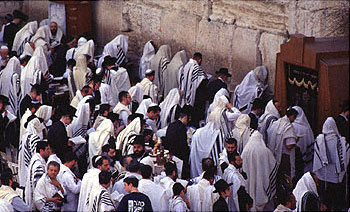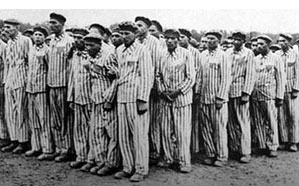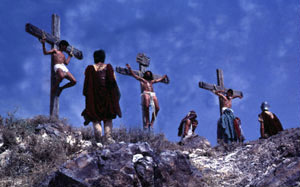Why Should Christians Care about the Jewish Roots of Christianity?
by Jeffrey J. Harrison
For many Christians, the Jews and Judaism seem like the last places to learn anything about the Christian faith. Christianity and Judaism appear to be opposites. For many centuries, it sounded heretical even to suggest that Jesus, Peter, and Paul were Jewish. Yet this is the historical reality: that Christianity worships a Jewish Savior, whose Jewish disciples founded a Jewish religion in Israel.

Jesus and his disciples spoke the Jewish language (Hebrew), they read the Jewish scriptures, they attended Jewish synagogues, they taught using the teaching techniques of the Jewish religious teachers of their day. These same Jewish disciples wrote most of our Christian scriptures in the New Testament. Jesus himself was a Jew of the line of David (Matt. 1:6). Paul was a student of the famous Rabbi Gamaliel (Acts 22:3).
What’s important about the Jewish Roots of Christianity? Everything. Because without the Jews and Judaism there would be no Christianity. And since Christianity started among the Jewish people, we must understand our Jewish Roots to understand the Bible correctly. Without them we are liable to misunderstand much of what the Christian faith is about.
Christian Anti-Semitism
Why is it that Christians know so little about their Jewish Roots? Beginning in the mid-second century AD, Gentile Christians began to reject Jewish Christians, calling them heretics. Why this change of heart? Because these Jewish Christians continued to live as Jews, just as Jesus, Peter, and Paul had done. Think about that for a minute: Gentile Christians began to reject their Jewish brothers and sisters in the faith because they continued to live in the same way that Jesus and the apostles had done.
Why did they consider it wrong that they lived as Jews? In large part it was a misunderstanding of the Bible’s teachings about Jews and Gentiles in relation to the Law of Moses. But it was also because of anti-Semitic beliefs brought by Gentiles into the Church.

These anti-Semitic beliefs and the actions that followed polarized Christians and Jews for centuries. Horrible persecutions and atrocities were done, mostly by Christians against Jews. The most horrible of all took place in recent history: the destruction of six million Jews in the Holocaust in Europe. These were not military casualties. They were civilians that were detained and killed, many of them in gas chambers. Who did this horrible thing? The Nazis. And who were the Nazis? Mostly Germans. Germany was one of the most Christian nations in the world: home of Martin Luther, the father of the Protestant Reformation. Why would a Christian nation do something so horrible? In part, it was because of the hatred that pastors and priests had long been preaching against the Jewish people
It’s one thing to recognize that a person or a group of people are sinners. The Bible says that all have sinned and fall short of the glory of God (Rom. 3:23). But to call for the destruction of an entire ethnic group because of the sin of their ancestors—or simply because of their ethnic identity—is something completely different. It’s a direct contradiction of the Bible, which says that each person is responsible for his own sin (Deut. 24:16, 2 Chron. 25:4, Eze. 18:20). Jesus commanded us to love our enemies (Matt. 5:44): how much more should we love the Jewish people, through whom our faith came to us (John 4:22)? The recognition of sin or error in a person or a group should inspire us to lead them into God’s grace and forgiveness, not to destroy them. Yet the church often took the opposite point of view: it counseled, or at least condoned, the destruction of the Jews.
Martin Luther himself wrote:
What will we Christians do with this rejected and condemned people, the Jews?... I will give you my sincere advice: First, to set fire to their synagogues...in honor of our Lord and of Christendom, so that God might see that we are Christians.... I advise that their houses also be...destroyed..... I advise that their prayer books and Talmudic writings...be taken from them.... I advise that their rabbis be forbidden to teach henceforth on pain of loss of life and limb.... (On the Jews and Their Lies, 1543)
Who Killed Jesus?
These cruel attitudes were encouraged by the popular teaching that the Jews killed Christ. But this is not what the New Testament says. According to the Bible, it was not the Jews, but Roman soldiers who killed Jesus (John 19:23). They did this in obedience to the orders of Pontius Pilate, the Roman (non-Jewish) governor of Judea (Mark 15:15). Yes, Pilate washed his hands. But if I wash my hands, does that make me innocent of a crime? Pilate could easily have spared Jesus if he wanted to. But he ordered his soldiers to crucify him. It was not the Jews who killed Jesus. It was the Gentile Romans!

Yes, the Jewish leadership participated in this crime: they brought Jesus to Pilate. This made them accomplices in the act, and gave them a moral responsibility for what followed. And there were individual Jews in the crowd that day shouting, Crucify him!
and His blood be on us and on our children
(Matt. 27:23,25). These are regrettable actions. But they do not give the Jewish people the sole responsibility for this murder. The Biblical teaching is rather that all have sinned
; all are responsible for the death of Jesus (Rom. 3:23).
The Jews could have killed Jesus. They almost did several times: once in Nazareth by pushing him off a cliff (Luke 4:29, see our teaching The Messianic Judge), twice in Judea by stoning (John 8:59, 10:31). But they never actually brought themselves to do it. The Gentiles had no such reservations. They killed Jesus the same morning he was delivered to them, and they have killed many hundreds of thousands, in fact, many millions of Jews since.
Pagan Influences
Anti-Semitism corrupted not only the Church’s morality, but also its beliefs. Pagan ideas quickly replaced Jewish and Biblical ones in the Church’s teaching and practice, and the original Biblical ideas were forgotten. Many of these Gentilizations
of the faith can still be found both in traditional churches and in many Protestant churches, too.
For example, in the Middle Ages the Roman Catholic Church taught, and still teaches today, that something called the Beatific Vision will be the reward of the righteous in heaven: that they will contemplate this beautiful vision
of God for eternity. This is a completely spiritual, and therefore a completely non-physical eternity with God. And it sounds suspiciously similar to the pagan Roman belief of a heavenly eternity for those that are worthy. Similar ideas have also been advocated by many Protestant groups.
So why is this a problem? Because the original Jewish and Biblical view of eternity is quite different. The Bible teaches an actual, physical resurrection of the body: a body that will be just as physically real as the bodies we live in today. Not only that, this physical resurrection implies a physical place to live: first in the earth of the Millennial kingdom (Rev. 20:4ff), then in the new earth and new heavens of eternity (Isa. 65:17; Rev. 21:1ff). Both were originally understood to be real, physical places, in which the fullness of life, including physical life, will be restored to us.
This idea of an actual, physical resurrection was laughed at by Gentiles in the time of the apostles (Acts 17:32) and is still widely rejected by their descendants today. But among the Jewish people, it was so important that to deny it was to become a heretic, denied a place in the world to come (Mishnah Sanh. 10:1). Jesus and the apostles accepted and taught this doctrine as a central belief: a belief that was greatly strengthened when Jesus himself rose physically from the dead, not as a spirit, but in a real, physical body that could be touched and could eat food (Luke 24:36-43; 1 Cor. 15:4ff).
For centuries, this beautiful, Biblical vision of a resurrected future, first in a restored earth in the Millennium and then in a new earth in eternity, was spiritualized and rejected by the Church because it was too Jewish.
Yet this is the only way to make sense of the Bible’s insistence on a real, physical resurrection. What need will there be for physical, resurrected bodies if we’re just going to float around in an immaterial heaven? Most Christian groups say they believe in the resurrection. But do we understand it the way Jesus and his Jewish disciples did?*
* For more examples of paganism in the Church, see our Jewish Roots of Christianity Seminar; for more on the prophetic future, see our Book of Revelation Seminar and the subject index category Prophecy.
Israel’s Prophetic Destiny
Being in touch with our Jewish Roots is not just a matter of accurate understanding. It’s also a matter of prophetic destiny. Israel is not meant to be just another nation: God’s plan for Israel is the key to God’s plan for the nations. Israel is God’s answer to a sinful and fallen world: a holy people, raised up by God as a testimony to the nations; a lighthouse pointing the way to the one true God.
As the apostle Paul put it:
Remember that you were at that time without Messiah, alienated from the citizenship of Israel and strangers to the covenants of promise, having no hope and in the world without God. But now, in Messiah Jesus, you [non-Jews] who once were far away were made near by the blood of Messiah.... So, therefore, you are no longer foreigners and strangers, but you are fellow-citizens [of Israel] with the holy ones [the Jewish believers in Jesus] and members of the household of God(Ephesians 2:12-13,19; see our teaching on Ephesians 2).
Through Messiah, Gentile believers in Jesus have been added to the nation of Israel. We, the wild olive branches, have been grafted into its rich root (Romans 11:17-24). Yes, other branches—many of them—have been broken off because of unbelief. Physical Israel (the Jewish people) is still largely in rejection of its Messiah. But God’s plan and purpose—Israel’s destiny—are unchanged.
Faith isn’t just about having the right beliefs; it isn’t even just about worshipping the right God. It’s about coming into a relationship of obedience—a covenant—with the one true God. This incorporates us into a nation: the nation of Israel, with all the loyalties and interrelationships that this implies.
But this prophetic nation is not restricted to the modern nation of Israel in the Middle East, nor even to the Jewish people, but includes those from every nation, people, and language that submit themselves to Israel’s Messiah (Rev. 5:9). This is the great crowd from all nations that bows down before the Father and the Lamb in the book of Revelation (Rev. 7:9-12, 14:2-3). But this crowd from the nations doesn’t change the fact that this is essentially a Jewish nation, built on the foundation of Abraham, Isaac, and Jacob, together with all who have followed them in faith, including the Messiah himself (John 4:22). We who are not Jewish need to align ourselves spiritually with this believing core group, the believing remnant of Israel, including the Messianic Jewish believers of today. And since the day is coming when national Israel will accept its Messiah, we must also identify by faith and hope with the modern nation of Israel and the Jewish people—believing that they, too, will one day accept Jesus (Yeshua) as their Messiah (Rom. 11:26).
This identification with Israel does not mean, however, that Gentile Christians are required to bring themselves under the Law of Moses and begin to live as Jews. There is an order and a structure to God’s plan. This can be seen in the Law itself and in the history of Israel. King David ruled over a greater Israel that included many Gentile nations in addition to his Israelite territories. Yet these Gentile areas were never brought under the Law of Moses.
So, too, Messiah Jesus rules a greater Israel that includes many kinds of sheep. Not all of these are Jewish; there are some from every tribe, language, and nation (John 10:16). But together, these two groups, Jewish and Gentile, make up the two major branches of the believing community as it was originally understood in the New Testament: believers from the circumcision
on one side (Jewish believers in Jesus) and believers from the uncircumcision
on the other (Gentile believers in Jesus; Rom. 3:30, 4:9-12, 15:8,9; Gal. 2:7,12; Eph. 2:11; Col. 4:11). Each group has its own distinct calling, yet both are united in their testimony to Jesus as Messiah and Lord.*
* A distinction between Jews and Gentiles within Israel is taught by the Old Testament Law itself, a point with which the Jewish rabbis agree. They teach that Gentiles are responsible to a subset of the Law of Moses known as the Laws of Noah, an idea reflected in the decision of the Council of Acts 15. For more on Gentiles and the Law of Moses, listen to our seminar on the Jewish Roots of Christianity, or see our teaching on the Seven Laws of Noah and the subject index category Gentile Christians.
This is just a small taste of why the Jewish Roots of Christianity are so important. Without them, without an accurate historical understanding of our Jewish origins, Christianity is less than Christian. How can we get back to our Jewish Roots? It isn’t easy. We must be willing to confront centuries of tradition as well as many modern misunderstandings. But it’s the only way to recapture the original clear light of the gospel.